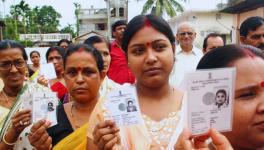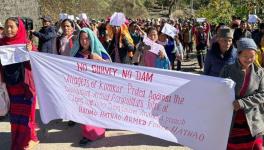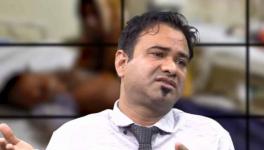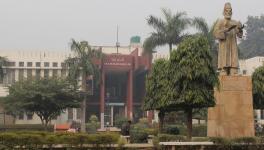Why ILP and NRC Demands Have to be Seen Together
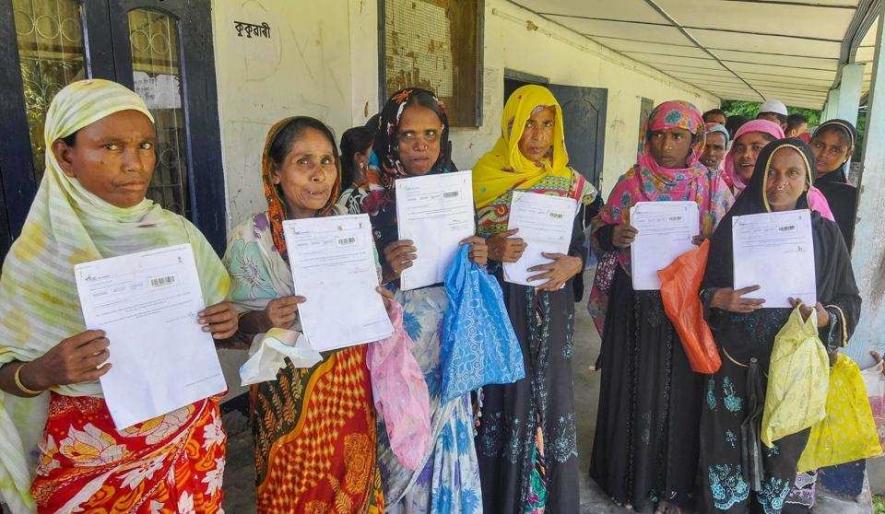
While the National Register of Citizens (NRC) is underway in Assam, similar calls can be heard in other states of the Northeast. However, addition to this cacophony is the demand for implementing the Inner Line Permit (ILP). So far, the loudest voice has come from Manipur, however, there is a call in Nagaland to extend the ILP to Dimapur. Similarly, in Assam, a civil society youth organisation has raised the demand for bringing in the ILP. This, once again, highlights the tenuous relationship the region has with the rest of the country.
Read more: Other States Too Are Demanding an NRC
Nagaland
In response to the NRC process in Assam, a new body comprising of civil society organisations, tribal Hohos, non-governmental organisations (NGO) and pressure groups has raised the demand for strengthening the ILP system in Nagaland. The Joint Committee on Prevention of Illegal Immigrants has demanded that the Bengal Eastern Frontier Regulation Act, 1873 should be extended to cover Dimapur district as well. At present, apart from Dimapur, the ILP system is in place for the whole of Nagaland.
The organisation has alleged that Dimapur will become a feeder district for migrants irrespective of whether they possess ILP passes or not.
Read more: Protecting the Land in the Northeast
Arunachal Pradesh
Like Nagaland, Arunachal Pradesh too is covered by the ILP system. Unlike Nagaland, there are no exemption areas for its operation. However, this has not allayed the fears of the locals. On August 1, the All Arunachal Pradesh Students Union (AAPSU) announced a fifteen-day window for all migrants in the state to ensure they had their documents and ILPs in order. AAPSU named this ultimatum 'operation clean drive'.
AAPSU General Secretary Tobom Dai told Newsclickthat they took this decision after the final draft of the NRC was published in Assam. They felt that those, whose names were left out, may try to enter Arunachal Pradesh and avoid legal action in Assam. He also said that as AAPSU is a constituent of the North East Students Organisation (NESO) and that NESO had announced that they would raise demand for an NRC in all the states in the Northeast, AAPSU was in consultation with experts to determine a cut-off year.
Manipur
On Saturday, the Ethno-Heritage Council (HERICOUN), a Manipur-based organisation held an event in Imphal where they resolved to submit a memorandum to the Union and state governments demanding an NRC for the state.
According to the Imphal Free Press, Prof R.K. Narendra Singh, the head of biostatistics department at the Regional Institute of Medical Sciences, told those in attendance that updating the NRC is the need of the hour to curtail the flow of migrants and to maintain demographic stability. He reportedly highlighted this by referring to the census reports from 1951 onwards to show an unusual spike in 2011.
Professor Chinglen Maisnam of the economics department in Manipur University told those in attendance that for the NRC exercise not to adversely impact the state, a work culture must be developed. He also mentioned that regulating the flow of labour and capital would help ease the issue of in-migration.
On July 23, the Manipur assembly passed the Manipur People’s Protection Bill, 2018. The Bill, apart from being a prime example of legislative incoherence and confusion, also attempts to regulate the entry and exit of 'non-Manipur' people. The Bill seeks to implement a 'permit system' through which the designated non-Manipur people can apply for residence and trade permits. Though similar to the Bills passed in 2015, which triggered massive protests among the Kuki-Zo people of the Hills, this Bill has instead been opposed by the Bengali-speaking people in Jiribam. Jiribam is a part of Manipur close to Cachar in Assam, and has seen migration from there over a long period.
Read more: Manipur to Introduce ILP Bill
Meghalaya
On August 12, it was reported that Meghalaya Chief Minister Conrad Sangma said that his government would consider whether to undertake an NRC exercise in the state. On August 1, the Khasi Students Union (KSU) had submitted a memorandum to the Deputy Chief Minister Prestone Tynsong demanding an NRC. The KSU had also demanded that 1971 be made the cut-off year for the purpose.
Meghalaya has not been free of similar demands. In the past, the state unsuccessfully attempted to pass laws regulating in-migration along the lines of the ILP system. These attempts never received presidential assent.
Read more: Is The Opposition Playing into the Hands of BJP on the NRC Issue?
Assam
While doomsday prophets were proved wrong by the lack of violence following the final draft NRC, the Asom Jatiyabadi Yuba Chatra Parishad (AJYCP) has gone a step further, and has raised a demand for ILP regulations in the state. The organisation will organise a state-wide protest today for this objective. They have been raising this demand since their inception in 1978. According to the organisation, updating the NRC is only a partial solution to the problems in the state. Having an ILP system along with an updated NRC, according to them, would ensure protection to the 'indigenous people' of Assam.
Read more: The Unheard Voices In The NRC Din Speak Up
What this means
The two seemingly unconnected demands – NRC and ILP – are actually completely intertwined in a relationship of apprehension and ethnic nationalism. However, the one common thread is that these demands do not appear to be aimed at other 'ethnically' Northeastern people, but rather at the phantom 'illegal immigrants' as well as the people from the 'mainland'. If one were to take an economic angle to this, it is true that a sizeable proportion of trade and commerce in the Northeast is controlled by non-locals. The ILP thus becomes a symbol of power over the financially powerful non-local traders. Another angle that is often cited by the proponents of these demands is the changing demography. This angle could hold true in the urban centres of most states, however, each state – perhaps barring Assam – has regulations controlling who can settle and reside in the rural regions. The net result is that the 'non-local' population is largely confined to the urban spaces where they have become more numerous over the years. It is unlikely that these demands will ever be met, though what is true is that Assam's NRC has set in motion a domino effect that will gain currency among a growing middle class in a job-scarce region.
Get the latest reports & analysis with people's perspective on Protests, movements & deep analytical videos, discussions of the current affairs in your Telegram app. Subscribe to NewsClick's Telegram channel & get Real-Time updates on stories, as they get published on our website.










